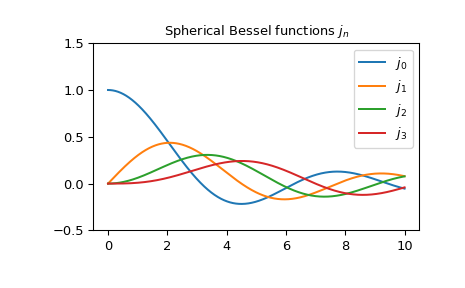scipy.special.spherical_jn#
- scipy.special.spherical_jn(n, z, derivative=False)[source]#
Spherical Bessel function of the first kind or its derivative.
Defined as [1],
\[j_n(z) = \sqrt{\frac{\pi}{2z}} J_{n + 1/2}(z),\]where \(J_n\) is the Bessel function of the first kind.
- Parameters
- nint, array_like
Order of the Bessel function (n >= 0).
- zcomplex or float, array_like
Argument of the Bessel function.
- derivativebool, optional
If True, the value of the derivative (rather than the function itself) is returned.
- Returns
- jnndarray
Notes
For real arguments greater than the order, the function is computed using the ascending recurrence [2]. For small real or complex arguments, the definitional relation to the cylindrical Bessel function of the first kind is used.
The derivative is computed using the relations [3],
\[ \begin{align}\begin{aligned}j_n'(z) = j_{n-1}(z) - \frac{n + 1}{z} j_n(z).\\j_0'(z) = -j_1(z)\end{aligned}\end{align} \]New in version 0.18.0.
References
- 1
- 2
- 3
- AS
Milton Abramowitz and Irene A. Stegun, eds. Handbook of Mathematical Functions with Formulas, Graphs, and Mathematical Tables. New York: Dover, 1972.
Examples
The spherical Bessel functions of the first kind \(j_n\) accept both real and complex second argument. They can return a complex type:
>>> from scipy.special import spherical_jn >>> spherical_jn(0, 3+5j) (-9.878987731663194-8.021894345786002j) >>> type(spherical_jn(0, 3+5j)) <class 'numpy.complex128'>
We can verify the relation for the derivative from the Notes for \(n=3\) in the interval \([1, 2]\):
>>> from scipy.special import spherical_jn >>> x = np.arange(1.0, 2.0, 0.01) >>> np.allclose(spherical_jn(3, x, True), ... spherical_jn(2, x) - 4/x * spherical_jn(3, x)) True
The first few \(j_n\) with real argument:
>>> import matplotlib.pyplot as plt >>> from scipy.special import spherical_jn >>> x = np.arange(0.0, 10.0, 0.01) >>> fig, ax = plt.subplots() >>> ax.set_ylim(-0.5, 1.5) >>> ax.set_title(r'Spherical Bessel functions $j_n$') >>> for n in np.arange(0, 4): ... ax.plot(x, spherical_jn(n, x), label=rf'$j_{n}$') >>> plt.legend(loc='best') >>> plt.show()
